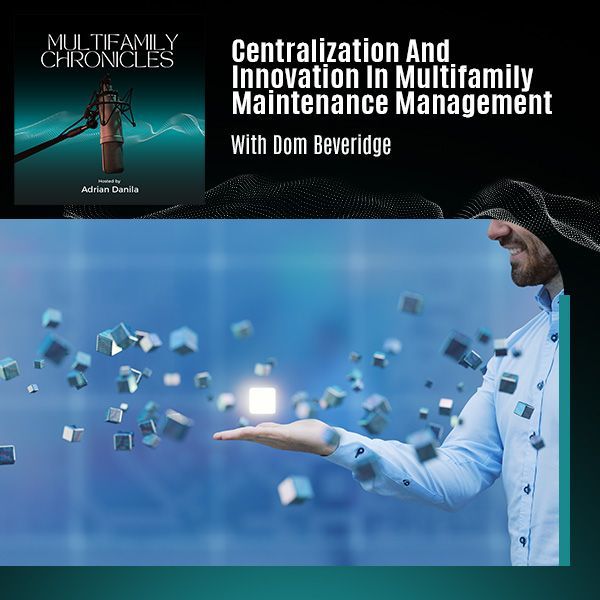Improving Employee Retention And Satisfaction With Kara Rice
Even prior to the great resignation, multifamily has experienced employee turnover levels that are about twice as in other businesses. We have somewhat accepted this phenomenon to be normal, but it’s something that’s completely solvable. Kara Rice makes this point in this inaugural episode of Multifamily Chronicles with host, Adrian Danila. A 30-year veteran in the industry, Kara is now the Chief Communications Officer at Swift Bunny, a company that helps multifamily companies increase employee satisfaction, drive down employee turnover, and improve their operations. Kara and Adrian unpack several topics ranging from company culture to micromanagement and all things related to employee turnover and retention. Join in and learn what really makes employees want to stay in their jobs and what you can do as a leader to improve retention in your company.
---
Watch the episode here
Listen to the podcast here
Improving Employee Retention And Satisfaction With Kara Rice
Welcome to the first episode of my new show. My guest is Kara Rice. She's a veteran of our industry. She has been in the industry for many years. She is the Chief Communications Officer of Swift Bunny. Welcome to the show, Kara.
Thank you so much. It is such a pleasure to be here with you for the inauguration of your show. Thank you so much for having me.
It's great to have you. Let's start by having you introduce yourself. Tell us a little bit about your background and what you're doing.
As you said in my intro, this is my 30th year in multifamily, so that makes me an old timer, which is always surprising to me because it doesn't feel that way to me. These years have gone very quickly, but let me tell you a little bit about my background. Probably, for many of the readers of this show, my career path in multifamily was totally accidental. Being in this space is not something I dreamed of as a child. I didn't even know that multifamily was a career that existed until I rented my first apartment.
At that time, they were hiring a leasing consultant in the leasing office. I completely stumbled into that role, and I readily admit that I took that position thinking, "This looks easy enough. I'll do this until I find a real job," not recognizing or realizing at all that it indeed was a real job and a job with unlimited potential for growth.
I quickly got the bug and thoroughly enjoyed that position, and moved up the ladder on the multifamily side. I ultimately was my own property manager and multi-site manager, and then moved into a training role on multifamily operations. It was probably around 1998 I made the leap over to the bright side, as we like to refer to it, the supplier side of the fence. For many years, I was part of the team at Grace Hill, where we were involved in learning and development with multifamily.
For the past several years, I've been a part of the team over here at Swift Bunny. Swift Bunny was founded by Joe Bailey, who also founded Grace Hill. He and I have been partnered together for a number of years. It's fun to be working with some familiar friends over here at Swift Bunny. If you don't mind, this is a quick little plug because not everyone is familiar with our company. What we do over here at Swift Bunny is work with multifamily companies to engage their employees.
What we offer are confidential employee feedback surveys. We help management companies find out how their teams are feeling, what's working for them, and what's not working for them so that they can make improvements and help boost the satisfaction of their team members and their loyalty. We ultimately want to help them drive down employee turnover and improve their operations. That's been a fun adventure for me.
It's great that you're telling us a little bit about your company and what you are doing over there because one of the things I want to talk to you about is the hottest topic that it's taking over not just our industry but all industries, in general. The topic is the Great Resignation. What is it? How does it affect our industry, and how did we get here?
That is a hot topic not just for multifamily but for every industry. You're 100% right. It is a trying time to be in the position of trying to staff a community or multiple communities now. Trying to staff any workplace is very challenging. Staffing has always been a challenge in multifamily. We suffer from very high employee turnover in multifamily. We always have.
That is a challenge we haven't addressed head-on in multifamily, but now that the whole world is facing employee turnover stresses, it's coming to the forefront. Even prior to what's been built as the great resignation, multifamily has experienced employee turnover levels on average that are about twice other businesses. We've accepted that as normal. It's anything but normal, and it's completely fixable if we put our attention and our focus on it.

Let's talk about what's happening at this particular moment, the Great Resignation. We are experiencing staffing shortages. There are flat-out not enough bodies, never mind qualified bodies, to fill the vacant positions. In multifamily, there are a couple of factors here. During the height of the pandemic, the normal attrition or folks who normally would have left their jobs, maybe that were slightly depressed or unwilling to leave because everything was so uncertain in the world, some of that attrition is pent up, and it's happening now. Not that we're past the pandemic, but things are a little bit more normalized.
Certainly, multifamily work has gotten a lot harder in the last few years. The pandemic has made working on-site more challenging than it ever has been. For that reason, we're seeing a lot of folks heading for the exit and trying to figure out where they can work that might not be so high-stress or not feel quite so unsafe because the pandemic has certainly raised safety concerns for folks as well. There are some discomforts with interacting with residents and going into their apartments, etc.
With the staffing shortages that all industries are facing now, job temptations are plentiful. People are seeing that other employers are hiring. Even if they may be under normal circumstances and might have been satisfied to stay put, they're being tempted by job offers, opportunities, higher salaries, and sign-on bonuses, all sorts of sources, not just within our industry but outside of our industry as well. It is a multifaceted problem. It's probably the biggest challenge that operators are facing now.
The staffing shortage is a multifaceted problem, and it’s probably the biggest challenge that multifamily operators are facing right now.
What are a few ways that you can think of suggesting to address this issue and ease the pain a little bit? What are your top 3 or 4 suggestions on how to address this phenomenon?
It starts with trying to make sure that you can stop the bleeding. What I mean by that is try to make sure that your existing employees do not leave. That should be priority number one for multifamily leaders now. Try to reduce employee turnover because, with the labor shortage we have now, the last thing you need is more open seats at your company.
This is challenging because many folks are focusing on job number one as filling those empty seats. That is also extremely important, but it can't come at the expense of taking care of the folks who are still there hustling for you and trying to get the job done. Fill the empty positions, but also make sure the folks who are there with you don't also leave.
Those folks are under great strain now. They deserve all of the attention that you can possibly shower on them. They need all the resources, help, and leadership's ear so that they feel like they're being heard and their needs are being met because you don't want those folks to be tempted by the other job opportunities as well. Employee retention has to be the top priority for organizations now.
One of the big things with so many communities being short-staffed, it is difficult on the folks who remain. They are shouldering so much extra responsibility. Do anything that you can do to try to help them get the job done. That probably means some extra labor or temporary help in order to ease that burden because otherwise, you're going to burn out the existing team. Tell me if that matches what you're seeing in the trenches now.
It is. It is very interesting. I want to go back a little bit. I've done a poll on LinkedIn, and in the poll, I've asked people, "Have you looked for an opportunity within the last month or the last several months?" The poll has not been closed yet, but the results are pretty amazing. It's not a scientific survey, it's my connections and my connections' connections that I could see and whoever wants to participate in a poll, but the percentage is getting close to 80% of people that looked for an opportunity within the past couple of months.
Within the past couple of months, 4 out of 5 people responded to considering different opportunities. That's very telling about the times they were living in. Going back to your question, can it be solved? What am I seeing? I have personal experience with this matter. Right before COVID started, I had an opportunity to build a facilities team for a management company. I was hired as a Director of Maintenance. I was allowed to hire support personnel. Between myself and five other individuals, our service portfolio was 25 properties across 6 Southeastern States.
The way this help is that we improve retention and are able to provide a very high quality of service to the residents. Our service request pending numbers at closing on Friday evenings stayed in single digits average per property for 85 consecutive weeks. Most of these 85 weeks were during the pandemic. Against all adversity, our teams were able to hold it together and not only that but try to provide excellent customer service. This is an example of how things could happen out there. They could be done if there's a will to do it. That's my personal experience.
That is so interesting to me. I want to ask you, during that experience, how was your employee turnover with your team?
It went down tremendously. First of all, I had to build KPIs because KPIs did not exist in that organization. Everybody knew that we went through a lot of pain. It was a very painful moment for us as an organization. Nobody could pinpoint why because we didn't have measurables. I first started creating these KPIs. When we started seeing numbers and see the productivity of each team, we revealed where the issues were and were able to start improving the quality of the work. That generated at the beginning a very high turnover.
This accountability piece that we introduced was not necessarily welcome by some individuals. Naturally, the change happened, but as soon as we stabilized, we reduced employee turnover by 50%. The first year that I was with the organization and started implementing KPIs and everything, our turnover rates were incredible. We're 80% of the first year in maintenance. That's a hurdle. In our second year, once we got the processes down and the support team in place, and everything worked like it was supposed to, our turnover rates were cut in half. That's, in my book, pretty amazing.
It is amazing. Also, you can connect that to the results that you were able to achieve. With your lower turnover, you've got expertise or experienced staff. You have confidence. These folks are able to get those work orders completed satisfactorily without callbacks. It's all connected there. The resident's satisfaction, I would anticipate probably kind as well.
There is also another thing too. When you have people who tend to stick around for longer, you build a certain sense of community and release a lot of pressure on the team. How does that happen? We start with a higher level of service request pending, and if the same team works hard and gets them down to a lower manageable number and keeps them there at a manageable level, you are not in a reactive mode anymore. You are able to turn the tables from a reactive mindset to going proactive. You get your service request as close as possible to zero. You are ready for whatever comes at you versus letting the events plan the day for you.
When you have people that stick around for longer, you build a certain sense of community, and also it releases a lot of the pressure on the team.
For example, we have three floods. We have to service fifteen ACs. Where are we going to go first? That is not the type of environment that you want to have, but it takes time and effort together. People might think, "We can't afford this." Let me tell you that every decent size company can afford it. Let's say that my company has ten properties in a certain market, and we had to look at how many maintenance openings we have on average throughout a six-month period.
For this portfolio with ten properties or this market, we average about five openings at any given time. If we know that we have this vacancy, there's payroll available because when we have five openings at any given time, the payroll for five individuals is not being spent. This is money that we could spend. The way I would spend it is to hire personnel that will be managed at a corporate level to create a facilities team as I did in practice. You don't have to hire five people. If you hire two individuals for that particular market, they're very well paid, and they know what they're doing, you would not feel like you are missing this many bodies. You won't feel that weight at all.
The two individuals should be able to absorb the work of 3, 4, or 5 people. It's pretty amazing the stuff and the impact that only a few individuals could make under the circumstance that they're the right individuals. They have the right mindset and skillset and are all about executing and directed the right way. It's not only about having the resources but how you use the resources in the most efficient way possible. It could be done with no extra financial effort on the management side.
I know there's a concern, and some management companies will say, "What are we going to do when we have no vacancies? How are we going to distribute the payroll?" I'll say, "If you are ever going to be in that situation, that's a great problem to have." Not having any vacant positions. I said, "Let's cross that bridge when we get there."
I could promise you that even if that's the case and it happens, there are so many other things that we typically contract out that these individuals, the flooring team, the relief team, or the facilities team typically do, so you don't contract that stuff out. You take more staff in-house. You could do preventive maintenance. There's a lot of value that individuals like this could provide to any property management, company, or group.
That's fascinating. I agree with you wholeheartedly with your comment that it is a good problem to have. It probably feels like a complete fantasy now with the staffing shortage that most folks are facing. They can't even imagine having that good problem. Most leaders would say, "Bring on that problem."
This brings me to the next topic that I like to discuss. Everything revolves around company culture, in general. I always use the terms micro and macro. What do I mean by this? Micro is a small environment. It's like the site-level environment. Who creates this environment? It's the people that belong to the environment. You have regional-level involvement and everything that contributes to a certain type of culture that you have at a site level, but for the most part, it's the folks that work together on site. That's your micro. For macro, it's the company as a whole. This is the number one thing that has to change and be looked at in order to get higher retention rates for our employees. Do you agree?
I 100% agree. It matters in large ways and small company culture. First of all, let me start with a definition because a company culture or workplace culture can be a nebulous concept. Folks don't know exactly what it means. Let me spell it out in a very simple way. For this, I give the nod to the educator, Jill Christensen, whom I heard speak several years ago. She's so inspiring. She distills it down to something that is so easily understood.
Company culture, very simply, is how we do things around here. It is how leadership, everybody at the site level, everyone and every level all the way down to how the communities operate. It includes how we talk to people and how the manager speaks to the service team. Is it with respect and appreciation? Is it with contempt? Do they treat their service team members like they are hired to help or slaves? This all contributes to the company culture and how people feel about being a part of that team. How we do things around here, how we treat people, and all of that matter in big ways and small. It can make the difference in terms of whether folks are willing to stick around.
This is what we hear in our employee surveys. People speak to this and may not necessarily use the phrase "company culture," but they speak about how they're treated. Whether their efforts are recognized or appreciated, or if people even notice the work that they are doing, that matters a lot. In fact, one of the levers leaders can push in order to drive up retention of their employees is to take the time to acknowledge the work that team members are doing and say thank you and have more conversations with every individual on their team.

Another piece of a company culture that matters a lot is access to resources, tools, and support that folks need. There are so many comments about their real sense of frustration that it is hard for team members to get their work done because there are so many restrictive policies around approvals. I was looking through some comments on employee surveys. I saw a trend with folks saying that they don't have the ability, power, or authority to do any approvals on-site, and it is incredibly frustrating.
They have to turn to their regional to get anything done. To me, that's such a bottleneck. I would encourage leaders to take a close look at their policies and procedures and make sure that they're not getting in the way of employees being able to deliver good service to their residents because those were the complaints I was seeing.
It's fascinating that you are mentioning this. From personal experience, I completely agree that this is one of the issues that the sites are facing. There are some adversities perceived as bottlenecking. We can't get stuff done because we can't get the proper approvals. We are hiring community managers and service managers. These individuals are in charge of $60 million, $70 million, and $80 million worth of real estate. If we hire them, we give them this huge tremendous responsibility to take care of this piece of real estate that's so valuable. Why not trust them with making the right decisions? Why not allow them to make mistakes? We make it unacceptable not to learn from them.
People have to be allowed to make mistakes, but they have to learn from them. You can't make the same mistake over and over again. That would not be a great thing for the business. I used this in past conversations with others for serving managers. You hired this individual for the service manager and give them $60 million or $70 million worth of real estate and say, "You do this. You take care of this."
By comparison, let's say that a money advisor is someone that advises people on what to do with their money. If you hire someone managing $60 million worth of other people's money, that's a very accomplished person. You don't need those individuals for them. Why is it different for a service manager? The perception and the way we look at this individual have to change. It's from, "We have to micromanage, oversee and manage everything they do," to, "We're going to empower you because that's what we hire you for."
What's the whole point of having a service manager? If somebody is not trusting the individuals making the right decisions for the asset, probably they're not the right individual for the job. That's what I would say. If you trust that person, hire them, and think they're qualified for the job, let them do the job. As you said earlier, stay out of their way.
If you really trust a person and think they qualify for the job, just stay out of their way and let them do their job.
Another piece to that frustration that we hear a lot about is not only that the folks on site, whether it's the service director or the manager, are not empowered to make decisions, that's one level of frustration, but then the second level is whoever they need to go to get that approval, it's not responsive. We hear that all the time that they are waiting and in limbo, looking for authorization, waiting for a callback or response from somebody else within the company. It's just so interesting to me.
In our business, we're laser-focused on being responsive to our resident customers and our prospect customers, but we fall down when it comes to taking care of our employees, customers, and coworkers. As leaders, we need to be responsive to our employees as well because we're getting in the way of them being able to deliver for residents.
I completely agree. Things have to change because if they don't change, we can't expect a different result if we do things the same way.
These are the frustrations that cause people to be tempted by other job offers. We want to dial down the frustration level for our teams if we expect them to stick around.
This is going to be the last topic for the day. I wanted to ask you what you see in employee surveys in regard to the on-call expectations. What is a person expected to do while on-call, and then what is the compensation for the on-call? I'm asking this because I'm a very close follower of Facebook maintenance-related groups, and this is probably the top complaint that the professional maintenance staff in our industry. It's a fact of being on-call, but that comes in the secondary, which is how they don't get compensated for the on-call.
The norm is that if you're going to be on call, you're going to come out at 2:00 AM because you have a flood and spend maybe two hours addressing that, and you go back. The next day, you're going to have to leave two hours earlier. The feedback that I'm getting is that our guys do not want to be sent home. They like to be paid for their time. "If I get up at 2:00 AM, this is the time I earn. Let me get paid for that and come to work regular schedule for eight hours and pay me the overtime." I want to know what you're seeing in a survey. I'm very interested in this topic.
You are 100% right that this is a pain point for folks on the service side about how their company handles the on-call procedure. I have mostly anecdotal evidence here from conversations we've had with clients and others in the industry about what seems to be working well for some operators. This is going to vary. I don't think there's a one size fits all solution. It depends on your team and your portfolio and how geographically dispersed you are, etc.
First and foremost, leaders need to find out how their team feels about whatever their current system is for compensating for on-call. Chances are there's some room for improvement there, but what I am hearing is similar to what you voiced that it's the least fun aspect of the job. Leaders are smart to try to figure out a way to make it a benefit for maintenance teams.
If they have to be on call, let's make it a benefit. What I mean by that is let's make it good for their wallet. Compensate them appropriately. We did see one management company that recognized this was the biggest pain point that they were hearing in their surveys. They assembled a team to try to figure out, "How can we make this better for our service teams?" They wound up paying an additional several hundred bucks for the weeks the individuals were on-call. It all of a sudden shifted from people not wanting to be on-call to people dying to be on-call because they were interested in having that extra money in their paycheck. That might not be the right solution for every portfolio, but it worked well for this team. It changed it from a negative to a positive.
I hear a lot about folks feeling nickeled and dimed about only getting paid for fifteen minutes when they were on call. I've seen leaders tell me that minimum pay is something that has gone over well with their teams. For example, if you respond to a call, you're going to get at least an hour of pay, even if it only took you fifteen minutes. That may be something that works.
It is specific to the team, and it's important that the team has a voice in the solutions that are put into place. You're then going to wind up with a program that is well-received by your team members, and perhaps they may even be enthusiastic about it if you can get it lined up properly in a way that they feel well-compensated.

I'm glad that you mentioned that they want to be heard. It goes back to people not feeling like they're invisible. Their feedback matters because they matter.
The worst thing you can do is decide something on high in the ivory tower of the corporate office and push it down because you'll miss the mark. The teams will resent that. Instead, listen to them, and they'll help you come up with the right solution.
In reality, it's what I've learned over the years. I've been taught real-life lessons by safety members. Those were situations where I imagined the solution for a problem was designed outside our office. When I asked for feedback, I proved to be wrong myself. I said, "This is right. This makes sense, but not the way I envision it." It all comes down to going to your people because they have most of the solutions for the problems. You have to listen to them. Listen not to provide a response but listen to understand. You will be amazed once that mindset changes, and you're willing to listen to your teammates to understand how much better teams could get.
You are 100% right. The ticket right there to reducing employee turnover is listening. Unless you're doing that on a regular basis, you don't even know what's frustrating your team members. You can make assumptions, but those assumptions could be way off base, so listening is critically important.
The ticket to reducing employee turnover is listening.
We could have gone for a couple of hours easily right here. I would love to continue the conversation. I have so many other topics that we haven't even touched on. I would love to have you back in the future. Before we wrap up, I'd like you to have the last word and what you would like to add in closing.
First of all, thank you again for the invitation. Thanks to the readers for sticking with us here. I would love to come back because there's so much more to talk about. To everyone who's reading this, I hope you can hang in there because this staffing shortage will not last forever. In fact, I already see some rays of light. The labor numbers that are being published were promising. Things are getting a little bit better, slowly but surely.
Multifamily remains to me a wonderful place to make a living. There is so much opportunity here. We can get through this. The best way to ride through this Great Resignation storm is to take care of the people who work with you and work for you. Do everything you can to make sure that their needs are met and that they will deliver for you, the company, and your residents. I look forward to brighter days when we don't have to struggle so much with employee turnover, but the struggle that we're facing now is helping multifamily operators to learn some important lessons about taking care of our employees.
We're facing a turning point. The way I see this situation, I won't call it a crisis. I will see it as a huge opportunity to make things better for all of us and our businesses because it's not just the employee that benefits from the changes but also the businesses. If you have happy employees, you're going to have higher productivity, and you're going to run a better business. That's the bottom line. It has been proven. It is a winning proposition. Take care of your people. Kara, thank you so much for joining me do the first episode of my show. I hope you all enjoy reading our conversation. I hope to have you back here, Kara, soon to continue the conversation because there's so much more to cover.
I would love that. Thank you so much for having me.





